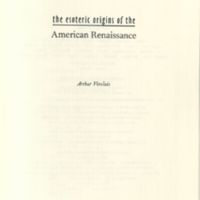The Esoteric Origins of the American Renaissance
Dublin Core
Title
The Esoteric Origins of the American Renaissance
Description
"The term "Western esotericism" refers to a wide range of spiritual currents including alchemy, Hermeticism, Kabbala, Rosicrucianism, and Christian theosophy. There are also various practical forms of esotericism including forms of divination like cartomancy, geomancy, and necromancy, as well as alchemy, astrology, herbalism, and magic. All of these were widespread in Western Europe during the seventeenth and eighteenth centuries, and made their way to the New World with the colonists. The early presence of esotericism in North America has been studied very little, and even less so the indebtedness to esotericism of some major American literary figures.
Here, Arthur Versluis breaks new ground, showing that many writers of the American Renaissance drew extensively on and were inspired by Western esoteric currents. Thus he demonstrates that Alcott and Emerson were indebted to Hermeticism, Christian theosophy, and Neoplatonism; Fuller to alchemy and Rosicrucianism; Hawthorne to alchemy; and Melville to Gnosticism. In addition to offering a detailed analysis of the esoteric elements in the writings of figures from the American Renaissance, Versluis presents an overview of esotericism in Europe and its offshoots in colonial America. This innovative work will interest students and scholars of religion, literature, American studies, and esotericism."--Jacket.
The term "Western esotericism" refers to a wide range of spiritual currents including alchemy, Hermeticism, Kabbala, Rosicrucianism, and Christian theosophy, as well as several practical forms of esotericism like cartomancy, geomancy, necromancy, alchemy, astrology, herbalism and magic. The early presence of esotericism in north America has not been much studied, and even less so the indebtedness to esotericism of some major American literary figures. In this book, Arthur Versluis breaks new ground, showing that many writers of the so-called American Renaissance drew extensively on and were inspired by Western esoteric currents. Before offering his detailed analysis of the esoteric elements in the writings of figures from the American Renaissance, Versluis offers an overview of esotericism in Europe and its offshoots in colonial America.
In this work, Arthur Versluis shows that many writers of the so-called American Renaissance were inspired by Western esoteric currents. Before offering his analysis of the esoteric elements in the writings of figures from the American Renaissance, Versluis offers an overview of esotericism in Europe and its offshoots in colonial America.
Here, Arthur Versluis breaks new ground, showing that many writers of the American Renaissance drew extensively on and were inspired by Western esoteric currents. Thus he demonstrates that Alcott and Emerson were indebted to Hermeticism, Christian theosophy, and Neoplatonism; Fuller to alchemy and Rosicrucianism; Hawthorne to alchemy; and Melville to Gnosticism. In addition to offering a detailed analysis of the esoteric elements in the writings of figures from the American Renaissance, Versluis presents an overview of esotericism in Europe and its offshoots in colonial America. This innovative work will interest students and scholars of religion, literature, American studies, and esotericism."--Jacket.
The term "Western esotericism" refers to a wide range of spiritual currents including alchemy, Hermeticism, Kabbala, Rosicrucianism, and Christian theosophy, as well as several practical forms of esotericism like cartomancy, geomancy, necromancy, alchemy, astrology, herbalism and magic. The early presence of esotericism in north America has not been much studied, and even less so the indebtedness to esotericism of some major American literary figures. In this book, Arthur Versluis breaks new ground, showing that many writers of the so-called American Renaissance drew extensively on and were inspired by Western esoteric currents. Before offering his detailed analysis of the esoteric elements in the writings of figures from the American Renaissance, Versluis offers an overview of esotericism in Europe and its offshoots in colonial America.
In this work, Arthur Versluis shows that many writers of the so-called American Renaissance were inspired by Western esoteric currents. Before offering his analysis of the esoteric elements in the writings of figures from the American Renaissance, Versluis offers an overview of esotericism in Europe and its offshoots in colonial America.
Creator
Arthur Versluis
Publisher
Oxford ; New York : Oxford University Press
Date
2001
Table Of Contents
1. Introduction -- 2. European Esoteric Currents -- 3. Esotericism in Early America -- 4. The Esoteric Ambience of the American Renaissance -- 5. Hitchcock -- 6. Poe -- 7. Hawthorne -- 8. Melville -- 9. Greaves -- 10. Alcott -- 11. Emerson -- 12. Fuller -- 13. Whitman -- 14. Dickinson -- 15. The Esoteric Origins of the American Renaissance.
Contents; 1 Introduction; 2 European Esoteric Currents; 3 Esotericism in Early America; 4 The Esoteric Ambience of the American Renaissance; 5 Hitchcock; 6 Poe; 7 Hawthorne; 8 Melville; 9 Greaves; 10 Alcott; 11 Emerson; 12 Fuller; 13 Whitman; 14 Dickinson; 15 The Esoteric Origins of the American Renaissance; Notes; Bibliography; Index
Contents; 1 Introduction; 2 European Esoteric Currents; 3 Esotericism in Early America; 4 The Esoteric Ambience of the American Renaissance; 5 Hitchcock; 6 Poe; 7 Hawthorne; 8 Melville; 9 Greaves; 10 Alcott; 11 Emerson; 12 Fuller; 13 Whitman; 14 Dickinson; 15 The Esoteric Origins of the American Renaissance; Notes; Bibliography; Index
Text Item Type Metadata
Original Format
Book
Citation
Arthur Versluis, “The Esoteric Origins of the American Renaissance,” Humanities Hub, accessed February 26, 2026, https://humanitieshub.sdsu.edu/omeka/items/show/1682.

